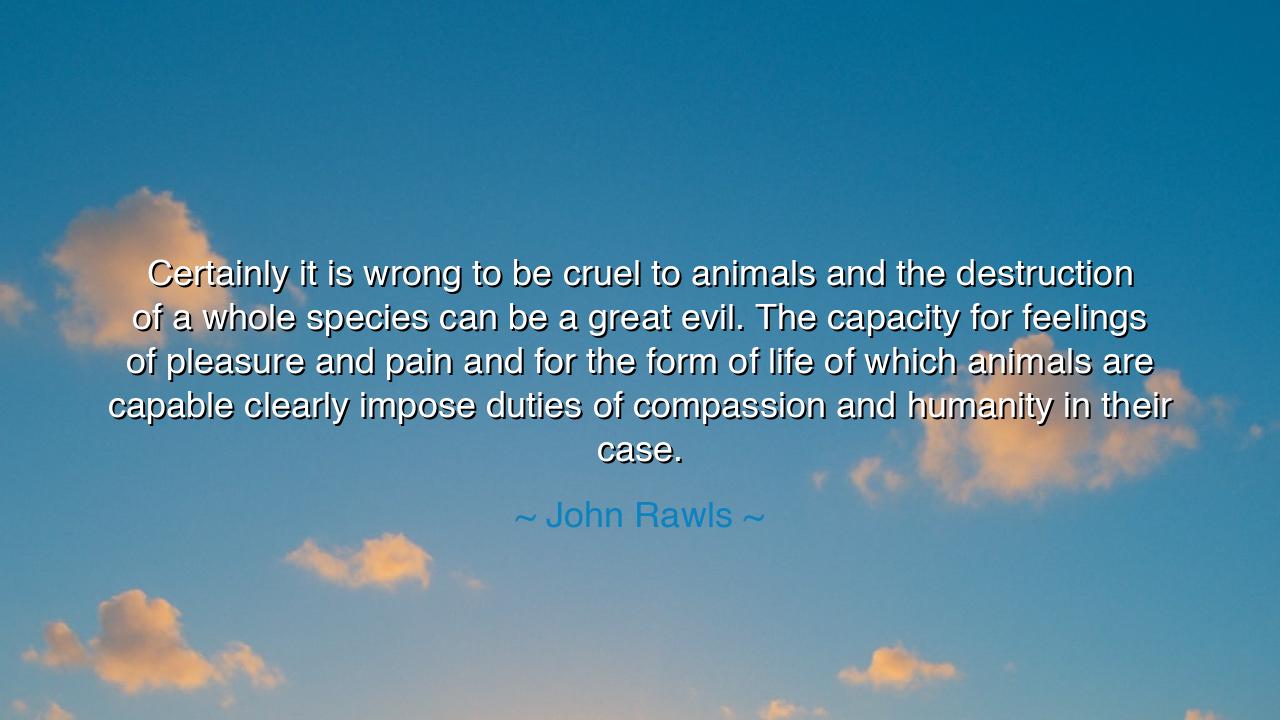
Certainly it is wrong to be cruel to animals and the destruction
Certainly it is wrong to be cruel to animals and the destruction of a whole species can be a great evil. The capacity for feelings of pleasure and pain and for the form of life of which animals are capable clearly impose duties of compassion and humanity in their case.






“Certainly it is wrong to be cruel to animals and the destruction of a whole species can be a great evil. The capacity for feelings of pleasure and pain and for the form of life of which animals are capable clearly impose duties of compassion and humanity in their case.” — John Rawls
In the voice of John Rawls, philosopher of justice and conscience, there resounds an ancient truth—one as old as the first dawn when humankind looked upon the living creatures of the earth and knew itself as guardian, not conqueror. When he spoke these words, he did not speak as a sentimental dreamer, but as one who understood the deep moral architecture that binds all beings together. His message was not about pity, but about duty—the sacred responsibility born from awareness. For to know that a creature feels pleasure and pain is to know that cruelty is a form of moral blindness.
Rawls, whose philosophy sought fairness in the heart of human society, extended that circle of justice beyond humanity’s walls. He saw that the capacity for suffering is not limited by species, nor by language, nor by form. The bird in its flight, the whale in the deep, the horse in the field—all experience their own measure of joy and sorrow. And thus, he reasoned, if we are beings of moral sense, we must act with compassion and humanity toward those who cannot speak in words but cry out in ways our hearts can still hear. To ignore their pain is to betray the better angels of our nature.
This idea is as ancient as the teachings of Ashoka the Great, the Indian emperor who, centuries before Rawls, laid down his sword after seeing the carnage of war and declared protection for animals as part of his empire’s law. He built sanctuaries for beasts, banned needless slaughter, and proclaimed that mercy toward living beings was the truest victory of the human spirit. In his rule, elephants walked unchained, deer roamed freely, and compassion became a measure of civilization itself. In this, he lived the very wisdom Rawls would later speak—that justice without compassion is hollow, and compassion without action is but a whisper on the wind.
Look too upon the lessons of our age. The destruction of species—the vanishing of forests, the silence of seas once filled with song—is not just a loss of beauty, but a moral failing. Each extinction is a severed thread in the great tapestry of life, a wound upon the world’s soul. The tiger that disappears, the coral that bleaches, the bird that ceases to sing—they remind us that we are not apart from creation, but a part of it. When we destroy what we should protect, we diminish our own humanity.
Rawls’s words pierce through the illusion of human supremacy and awaken the duty of compassion—a duty that comes not from weakness, but from strength. To show mercy to the powerless, to guard those who cannot defend themselves, is the highest expression of justice. For humanity is not measured by intellect or invention, but by kindness. The beasts of the earth, the fish of the sea, the birds of the sky—all trust, in their innocence, that we will not betray them. We must prove worthy of that trust.
The lesson, then, is clear and timeless: the moral circle must widen. It is not enough to love one’s kind; we must love all forms of life that share this world with us. Let every man and woman remember that power is a burden of care, not a license to harm. To walk with compassion is to walk in harmony with the universe itself. To be cruel is to stand alone, exiled from the living spirit of creation.
So let your actions be your offering to the greater good. Protect life where you find it, speak for those who cannot speak, and restrain the hand that wounds. Plant a tree, free a creature, tend to the suffering. In every gentle act, you honor not only the animal world, but your own soul. For as Rawls reminds us, the truest justice is not written in laws, but in the quiet choices of the heart.
And when the ages pass and our works turn to dust, it will not be our monuments or empires that endure, but the measure of our mercy. For only compassion is eternal, and only love can bind up the wounds of creation. To live justly is to live kindly—and in that kindness, we fulfill our destiny as stewards of the living world.






AAdministratorAdministrator
Welcome, honored guests. Please leave a comment, we will respond soon